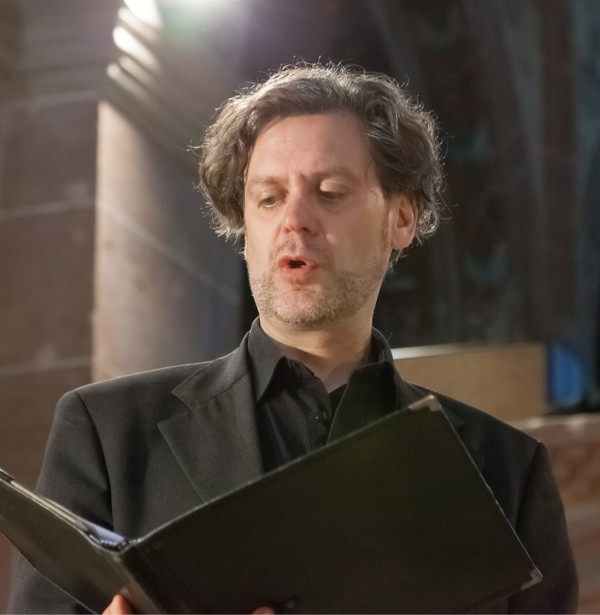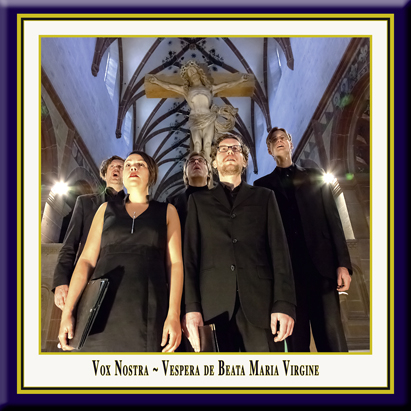Gregorian & Cistercian Chants · Vespera de Beata Maria Virgine
Vespera de Beata Maria Virgine
A Vespers of the Cistercian Order in the 13th century
With works by Monastery Maulbronn, Cistercian nuns of the monastery Las Huelgas and Cistercian Antiphonary from Morimondo,
Ensemble Vox Nostra:
Winnie Brückner (Soprano) · Philipp Cieslewicz (Countertenor)
Christoph Burmester (Tenor) · Werner Blau (Bass)
Burkard Wehner (Tenor and Music Director)
A live recording from the church of the German
UNESCO World Heritage Site Maulbronn Monastery
HD Recording · DDD · Duration: c. 63 Minutes



V
ox Nostra is a vocal ensemble based in Berlin, Germany, founded in 1999 by Burkard Wehner. Specialized in the performance of medieval music the main focus of the group is the interpretation of the earliest surviving compositions from the cultural centers of Europe. Sung from manuscripts originating in monasteries, cathedrals, and courts, this music is an acoustical insight into the archaic sound world of the Middle Ages.
The members of Vox Nostra have pursued extensive scholarship in the fields of musicology, medieval paleography, and theology. The music of Vox Nostra combines expressive musicality and academic curiosity. The repertoire includes Gregorian and pre-Gregorian chant and the specific liturgical music of the different medieval orders like Cistercians, Dominicans, Carthusians and Franciscans dating from the 10th to the 14th century. Furthermore Vox Nostra sings early polyphony from the 12th to the 14th century and the richly polyphonic compositions of the Renaissance. A special feature of the ensemble is the practice of singing scores researched from original manuscripts. The musical interpretation made by Vox Nostra has specific consequences on the old forms of notation, such as neumatic notation of the chorale, the modal notation of the Notre-Dame organa, and mensural notation. In order to give these features the emphasis they deserve, ensemble Vox Nostra favours a slow, flowing style of performance in an appropriately restrained tempo.
The vocal sound which results is rich in overtones, and fills the entire space; it allows the archaic and pure intervals of this music to be fully appreciated, and ensures that the complex weaving of the individual voices is clearly audible. In addition to the original manuscripts, research and this interpretation of the music from the 12th-16th centuries also provides new information the regarding tempo, ornamentation and the practice of solo performance of the chants. The unique acoustical situation of each concert location influences concert presentations, as well as the choreography of singers, hence time in each venue to work how the singers can move between various points in the room to integrate the acoustic properties of each site into the score.

The leader of the Ensemble, Burkard Wehner, was born in Steinach an der Saale /Unterfranken. Study of German and Theology at the Julius-Maximilian University Würzburg. Study of "Medieval and Renaissance Vocal Music", and musicology at the Brabant Conservatory in Tilburg, Holland. International master classes with Andrea von Ramm, Jill Feldman, Marcel Pérès and Pedro Memelsdorff. Soloist at many international festivals in Poland, Holland, Austria, France, and Germany. Musical advisor to many medieval ensembles. Extensive musicological activity in the research of medieval source material. Instructor in the field of music sociology at the Humboldt University, Berlin. Teaches workshops and seminars on the interpretation and performance practice of medieval vocal music. Director of the Baroque opera Zenobia from Tommaso Albioni (1694) for the Syrian National Opera Damascus / Cultural Capital Damascus 2008. Member of the advisory board for the exhibition „The Council of Constance 1414-1418" in Constance from April to September 2014. Lives and works in Berlin.
P
ublishing Authentic Classical Concerts entails for us capturing and recording outstanding performances and concerts for posterity. The performers, audience, opus and room enter into an intimate dialogue that in its form and expression, its atmosphere, is unique and unrepeatable. It is our aim, the philosophy of our house, to enable the listener to acutely experience every facet of this symbiosis, the intensity of the performance, so we record the concerts in direct 2-Track Stereo digital HD. The results are unparalleled interpretations of musical and literary works, simply - audiophile snapshots of permanent value. Flourishing culture, enthralling the audience and last but not least also you the listener, are the values we endeavor to document in our editions and series.
The concerts at the UNESCO World Heritage Maulbronn Monastery supply the ideal conditions for our aspirations. It is, above all, the atmosphere of the romantic, candle-lit arches, the magic of the monastery in its unadulterated sublime presence and tranquillity that impresses itself upon the performers and audience of these concerts. Renowned soloists and ensembles from the international arena repeatedly welcome the opportunity to appear here - enjoying the unparalleled acoustic and architectural beauty of this World Heritage Site, providing exquisite performances of secular and sacred music, documented by us in our Maulbronn Monastery Edition.
Andreas Otto Grimminger & Josef-Stefan Kindler, K&K Verlagsanstalt
1 ~ Zum Beginn der Vesper: Deus in adiutorium meum intende
Paris, BN n.a.l. 1412, Zisterzienserantiphonar aus Morimondo von 1175, fol. 112r
1. Antiphon: Cum esset rex (Hl 1,11) & Psalm 109: Dixit Dominus [5:32]
Karlsruhe, Badische Landesbibliothek, Kl. L. 29, fol. 170v
2 ~ 2. Antiphon: Unguentum effusum (Hl 1,2) & Psalm 112: Laudate pueri [4:01]
Aus dem Kloster Maulbronn von 1249, Karlsruhe, Badische Landesbibliothek, Kl. L. 29, fol. 171r
3 ~ Conductus: Ave Maria gratia plena [4:23]
Zisterzienserinnenkloster Las Huelgas, Klosterbibliothek, ohne Signatur, fol. 151v, um 1320
4 ~ Motette: Salve virgo ~ Ave gloriosa ~ Domino [2:49]
Zisterzienserinnenkloster Las Huelgas, Klosterbibliothek ohne Signatur, fol. 100v, um 1320
5 ~ 3. Antiphon: Nigra sum, sed formosa (Hl 1,4) & Psalm 121: Laetatus sum [4:57]
Paris, BN n.a.l. 1412, Zisterzienserantiphonar aus Morimondo von 1175, fol. 169r
6 ~ Sequenz nach einer Antiphon: Salve regina gloriae [4:31]
Zisterzienserinnenkloster Las Huelgas, Klosterbibliothek, ohne Signatur, fol. 80r, um 1320
7 ~ Confession: Credo in unum Deum [5:21]
Zisterzienserinnenkloster Las Huelgas, Klosterbibliothek, ohne Signatur, fol. 165v, um 1320
8 ~ Sequenz: Eya mater fidelium [6:08]
Zisterzienserinnenkloster Las Huelgas, Klosterbibliothek, ohne Signatur, fol. 46v, um 1320
9 ~ 4. Antiphon: Pulchra es, et decora (Hl. 6,3) & Psalm 113: In exitu Israel [8:49]
Paris, BN n.a.l. 1412, Zisterzienserantiphonar aus Morimondo von 1175, fol. 169v
10 ~ Capitulum: Ab initio (Jes Sir 24,14) & Responsorium breve: Specie tua (Ps 45, 5) [1:48]
Paris, BN n.a.l. 1412, Zisterzienserantiphonar aus Morimondo von 1175, fol. 21v
11 ~ Zisterzienserhymn us: Ave maris stella [2:51]
Stift Heiligenkreuz, Zisterzienserhymnar, Codex 20, fol. 6r, 13. Jahrhundert
12 ~ Motette: O Maria, maris stella ~ O Maria, virgo davitica ~ In veritate [3:57]
Zisterzienserinnenkloster Las Huelgas, Klosterbibliothek, ohne Signatur, fol. 102v, um 1320
13 ~ 5. Antiphon zum Magnificat: Sancta Maria ~ Magnificat anima mea [6:14]
Paris, BN n.a.l. 1412, Zisterzienserantiphonar aus Morimondo von 1175, fol. 101r
14 ~ Zum Vesperabschluss: Benedicamus Domino cum cantico ~ Deo gratias [2:17]
Zisterzienserinnenkloster Las Huelgas, Klosterbibliothek, ohne Signatur, fol. 21r, um 1320
Recorded, released & created by Andreas Otto Grimminger & Josef-Stefan Kindler in cooperation with Jürgen Budday.
Concert Date: June 2, 2012
Sound & Recording Engineer: Andreas Otto Grimminger
Mastering: Andreas Otto Grimminger & Josef-Stefan Kindler
Photography: Josef-Stefan Kindler
Artwork & Coverdesign: Josef-Stefan Kindler

This is an absolutely beautiful performance
This is an absolutely beautiful performance. It is crisp it is authentic. The recording captures the ambiance of the Monastery. Vox Nostra is tops in my list. If your looking for Gregorian chant crab this before it ascends to heaven.






This is an absolutely beautiful performance
23. December 2014 - 13:36 — kuk-art.com'Maggie' on Amazon.com